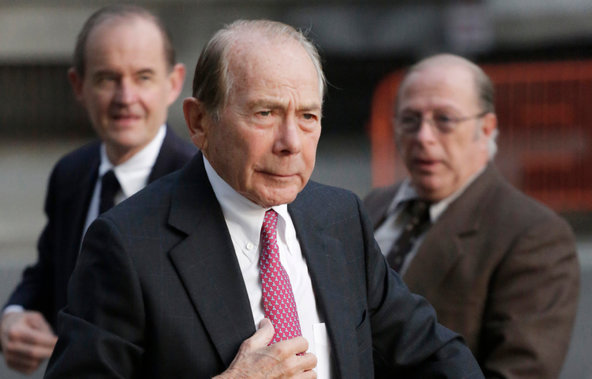 Mark Lennihan/Associated PressMaurice R. Greenberg, A.I.G.’s former chief executive, met with the company’s board on Wednesday.
Mark Lennihan/Associated PressMaurice R. Greenberg, A.I.G.’s former chief executive, met with the company’s board on Wednesday.
9:09 p.m. | Updated
The American International Group will not join a lawsuit against the federal government over its $182 billion financial crisis bailout, the company said on Wednesday.
The decision by A.I.G.’s board follows a public uproar that erupted after The New York Times reported on Monday night that the company was weighing whether to join a $25 billion lawsuit filed by its former chief executive, Maurice R. Greenberg, on behalf of fellow shareholders.
That case argues that shareholders lost tens of billions of dollars when the government attached onerous terms to the bailout. Lawmakers and others had pilloried the company, saying that joining a lawsuit against its rescuers would make it “the poster company for corporate ingratitude and chutzpah.”
Related Links
On Wednesday, the board of the insurance company gathered at its headquarters in Lower Manhattan to listen to presentations from Mr. Greenberg and the government. Senior officials from the Treasury Department and the Federal Reserve Bank of New York, the defendants in the lawsuit, were accompanied by lawyers from Davis Polk Wardwell and Debevoise Plimpton.
A timekeeper was on hand to ensure that each side stayed within the agreed limits: about 45 minutes for Mr. Greenberg and 30 minutes for each government agency, followed by a few minutes for rebuttals.
The government argued that Mr. Greenberg’s claims were frivolous, as the company’s only alternative was bankruptcy — a far worse outcome for shareholders.
After the meeting, which lasted all morning, the board voted unanimously to steer clear of the case. It also decided to ask Mr. Greenberg to forgo legal claims in the company’s name.
“The board’s decision today was about continuing to move this company forward, not backward,” Robert H. Benmosche, A.I.G.’s chief executive and a director, wrote in an internal memorandum to employees. “We as a company have kept our promise to return every dollar America invested in us, plus a substantial profit.”
The decision on Wednesday ends more than a year of suspense over what A.I.G. would do. Starr International, a company run by Mr. Greenberg, filed the case in late 2011 in federal courts in Washington and New York and has long pressured the company to join.
The lawsuit claimed that the fine print of the bailout, including the deal’s high interest rates and the funneling of billions to the insurer’s Wall Street clients, violated the Fifth Amendment, which prohibits the taking of private property for “public use, without just compensation.”
The board’s vote deals a blow to Mr. Greenberg’s case, which had already been dismissed in the Federal District Court in Manhattan. That decision is under review by the United States Court of Appeals for the Second Circuit; the judge in the Court of Federal Claims in Washington declined to dismiss the case.
David Boies, the prominent trial lawyer representing Mr. Greenberg, said in a statement: “We continue to believe that the attempt by the A.I.G. board to prevent Starr International from pursuing claims on behalf of A.I.G. shareholders is contrary to the shareholders’ interests.”
A.I.G.’s directors faced a difficult choice, debating the matter extensively during a dinner in the corporate dining room Tuesday night. While they were required to weigh the claims, joining the case would have added fuel to the public fire over the company’s rescue, one of the biggest and most controversial of the financial crisis.
The meeting coincided with an aggressive advertising campaign by the company thanking taxpayers for rescuing it during the crisis. And it comes only weeks after the insurer fully repaid its bailout, generating about $22 billion in profit for the public.
But the members of A.I.G.’s board, most of whom joined after the rescue effort, owed a duty to shareholders to consider the lawsuit. Mr. Greenberg could challenge the decision to abstain from the suit as failing to fulfill legal obligations to investors.
“The board was legally required to consider the Starr demand — the law and the courts required it — and we did so thoughtfully, weighing all the appropriate factors,” Mr. Benmosche wrote in the company memo. “That is what sound corporate governance and properly undertaking our responsibilities and obligations to our shareholders are all about.”
As the company sat on the sidelines for months, the government racked up huge legal costs as lawyers prepared hundreds of pages of court submissions.
But Henry T. C. Hu, a former regulator and now a professor of law at the University of Texas Law School, said that the brevity of the board’s deliberations on Wednesday implied that its mind had already been made up.
“The speed of the board decision today suggests that the remarkably unusual and expensive mock trial was a waste of time, besides insulting to the public and regulators,” he said. “A.I.G. should, at a minimum, fully reimburse the Treasury and the Federal Reserve for all time and expense that A.I.G. has inflicted.”
Article source: http://dealbook.nytimes.com/2013/01/09/a-i-g-says-it-will-not-join-lawsuit-against-government/?partner=rss&emc=rss